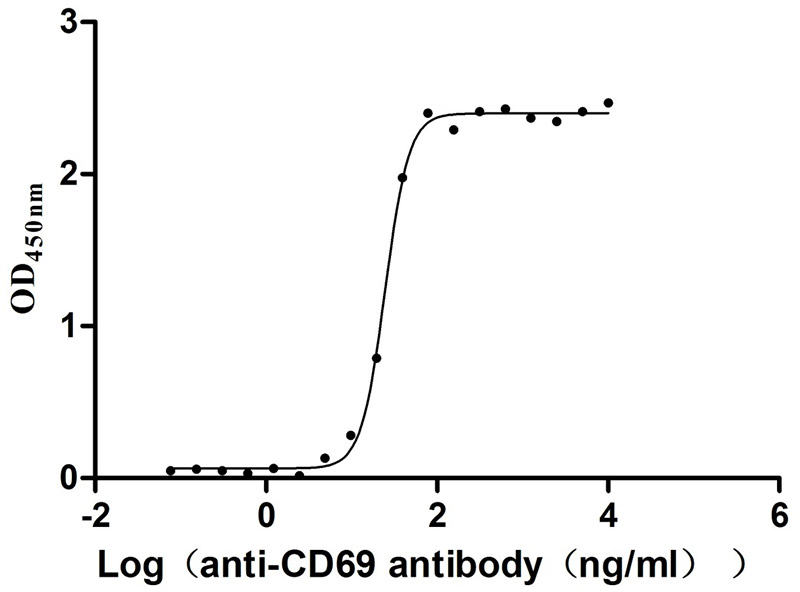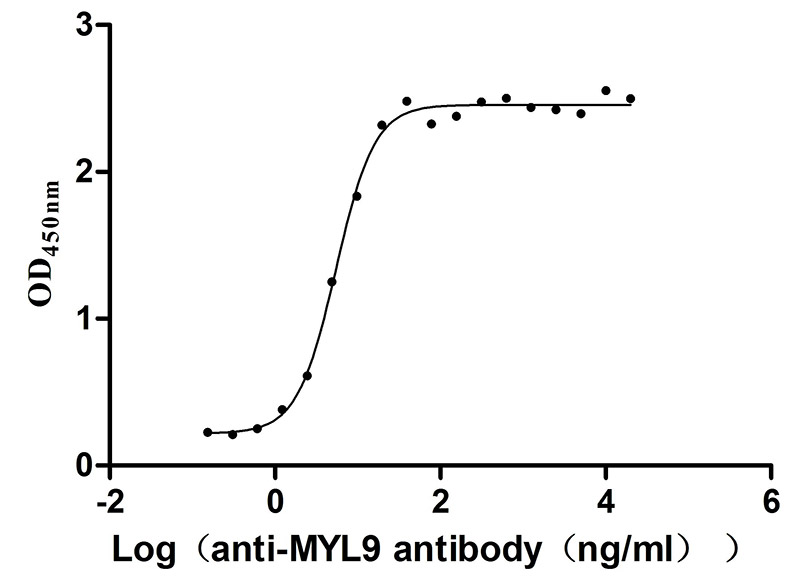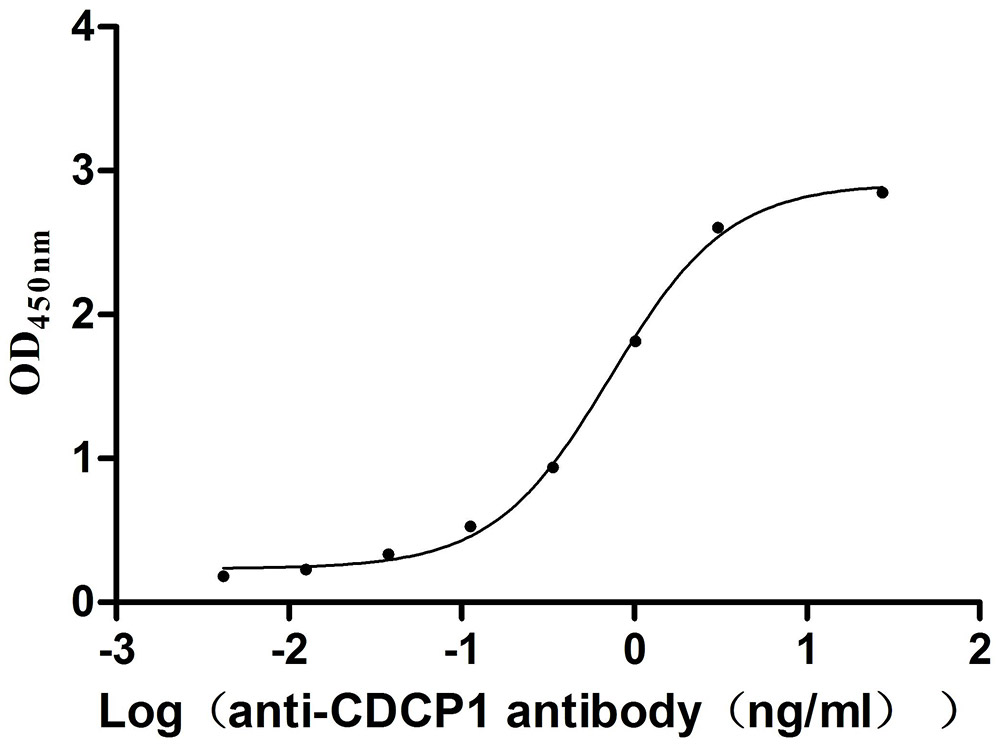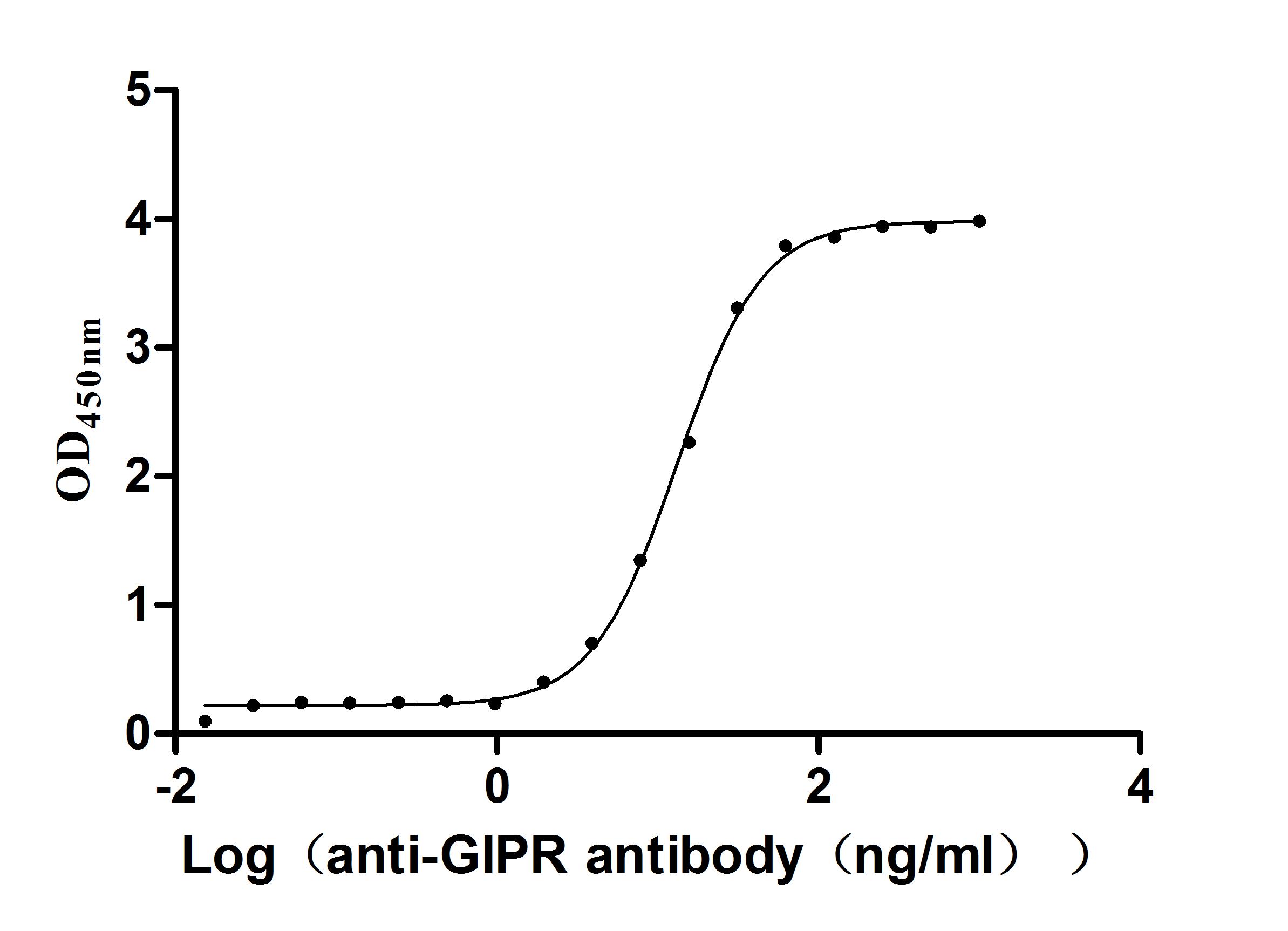Recombinant Rat Occludin (Ocln), partial
-
货号:CSB-YP016263RA1
-
规格:
-
来源:Yeast
-
其他:
-
货号:CSB-EP016263RA1
-
规格:
-
来源:E.coli
-
其他:
-
货号:CSB-EP016263RA1-B
-
规格:
-
来源:E.coli
-
共轭:Avi-tag Biotinylated
E. coli biotin ligase (BirA) is highly specific in covalently attaching biotin to the 15 amino acid AviTag peptide. This recombinant protein was biotinylated in vivo by AviTag-BirA technology, which method is BriA catalyzes amide linkage between the biotin and the specific lysine of the AviTag.
-
其他:
-
货号:CSB-BP016263RA1
-
规格:
-
来源:Baculovirus
-
其他:
-
货号:CSB-MP016263RA1
-
规格:
-
来源:Mammalian cell
-
其他:
产品详情
-
纯度:>85% (SDS-PAGE)
-
基因名:
-
Uniprot No.:
-
别名:Ocln; Occludin
-
种属:Rattus norvegicus (Rat)
-
蛋白长度:Partial
-
蛋白标签:Tag type will be determined during the manufacturing process.
The tag type will be determined during production process. If you have specified tag type, please tell us and we will develop the specified tag preferentially. -
产品提供形式:Lyophilized powder
Note: We will preferentially ship the format that we have in stock, however, if you have any special requirement for the format, please remark your requirement when placing the order, we will prepare according to your demand. -
复溶:We recommend that this vial be briefly centrifuged prior to opening to bring the contents to the bottom. Please reconstitute protein in deionized sterile water to a concentration of 0.1-1.0 mg/mL.We recommend to add 5-50% of glycerol (final concentration) and aliquot for long-term storage at -20℃/-80℃. Our default final concentration of glycerol is 50%. Customers could use it as reference.
-
储存条件:Store at -20°C/-80°C upon receipt, aliquoting is necessary for mutiple use. Avoid repeated freeze-thaw cycles.
-
保质期:The shelf life is related to many factors, storage state, buffer ingredients, storage temperature and the stability of the protein itself.
Generally, the shelf life of liquid form is 6 months at -20°C/-80°C. The shelf life of lyophilized form is 12 months at -20°C/-80°C. -
货期:Delivery time may differ from different purchasing way or location, please kindly consult your local distributors for specific delivery time.Note: All of our proteins are default shipped with normal blue ice packs, if you request to ship with dry ice, please communicate with us in advance and extra fees will be charged.
-
注意事项:Repeated freezing and thawing is not recommended. Store working aliquots at 4°C for up to one week.
-
Datasheet :Please contact us to get it.
相关产品
靶点详情
-
功能:May play a role in the formation and regulation of the tight junction (TJ) paracellular permeability barrier. May be involved in the organization of actin in endothelial cells.
-
基因功能参考文献:
- blood occludin levels correlate well with the extent of blood brain barrie damage. PMID: 28079139
- Both upregulation of claudin-4 and downregulation of occludin might increase paracellular NaCl transport in the kidney, resulting in impaired pressure natriuresis in SS rats. PMID: 29179201
- Up-regulation of miR-144 could promote intestinal hyperpermeability and impair the protective effect of the epithelial barrier by directly targeting OCLN and ZO-1. PMID: 29258088
- We provide quantitative evidence that claudin-11 contributes significantly to Sertoli cell tight junction function in vitro. Interestingly, occludin, which is hormonally regulated but not implicated in infertility until late adulthood, is also a significant contributor to barrier function. PMID: 26585695
- Mechanical ventilation can activate c-Src by phosphorylation and increase the degradation of occluding. PMID: 25471013
- In severe acute pancreatitis, downregulated expression of alphaSNAP in intestinal epithelial cells leads to reduced occludin expression, apoptosis of intestinal epithelial cells, and increased permeability of the intestinal barrier. PMID: 25278303
- actin cytoskeletal dynamics is detrimental to METH-induced BBB dysfunction by increasing internalization of occludin. PMID: 24081143
- cells transfected with Cx43 siRNA and grown in N medium showed significant downregulation in occludin (78 +/- 8% of control) and ZO-1 (81 +/- 6% of control) expression, and exhibited increased cell monolayer permeability. PMID: 24008412
- Results identified a crucial role of occludin in submandibular epithelial cells, and more importantly, demonstrated that occludin was required to mediate TRPV1-modulated paracellular permeability. PMID: 23345400
- High temperature inhibited the proliferation of rat Sertoli cells in vitro, and decreased the expression of OCLN. PMID: 23297502
- Disruption of pulmonary epithelium induced by hyperoxia is due in part to decreased expression of occludin and zona occludens (ZO)-1 proteins. PMID: 22559818
- Reverse-flow perfusions of mesenteric venules showed numerous small gaps in occludin expression on the endothelium. Similar gaps were not seen in vessels perfused in the forward direction. PMID: 23417864
- data indicate the possibility that interleukin 6 might be involved in the downregulation of occludin expression and in the modulation of blood-testis barrier permeability that occur in rats undergoing autoimmune orchitis PMID: 23018187
- Occludin and Zo-1 were reduced in intestinal mucosa both in mRNA and protein levels in the rat tail-suspension model. PMID: 21336719
- Occludin protein loss and claudin-5 redistribution are detected in ischemic microvessels following middle cerebral artery occlusion. PMID: 22378877
- Levels of tight junction protein occludin are decreased in blood-brain barrier cells post-translationally following exposure to neurotoxicants. PMID: 20970449
- A calcium-activated potassium channel activator increases blood-brain tumor-barrier permeability by down-regulating the expression of occludin. PMID: 21334421
- In female rats, increasing age and 17beta-estradiol treatment alters the expression of ERalpha and distinct blood-brain barrier tight-junction protein isoforms (occludin and claudin-5) without altering functional paracellular permeability. PMID: 21192956
- the evidence presented herein suggests the implication of occludin and, therefore, of blood-brain barrier in the pathophysiology of extrahepatic cholestasis. PMID: 20170644
- There was a significant down-regulation in the expression of occludin abd JAM-1 after exposure to microwave radiation. PMID: 20180397
- The presence of occludin in the tight junctions at the time of implantation suggests that the paracellular pathway is impermeable to water and Na(+) at this time, and that the transport of such substances takes place via the transcellular pathway. PMID: 19555995
- present in the junctions of the olfactory epithelium, and in the endothelial cells in the blood vessels in the lamina propria of the olfactory mucosa PMID: 11751462
- After ligation of the common bile duct, the expression of this protein was elevated in the liver. PMID: 11845325
- diabetes-related changes in cerebral zonula occludin-1 expression (zonula occludin-1) PMID: 11958524
- Occludin was immunoreactive at distal and proximal complexes of early differentiating ameloblasts and at distal regions of differentiating odontoblasts. However, in more advanced stages, occludin was only evident at the proximal complex of ameloblasts. PMID: 15052661
- In vitro blood-brain barrier model studies revealed that the pericyte-derived multimeric angiopoietin-1/Tie-2 pathway induces occludin expression PMID: 15056293
- Taken collectively, the results reported herein support the notion that db-cAMP-induced TJ disruption was mediated by an induction of Itch protein expression, which in turn triggered the ubiquitination of occludin resulting in TJ disruption. PMID: 15605377
- The effect of matrix metalloproteinase(MMP) inhibitors on endothelial gap formation, occludin loss, and the ability of monocytes to pass the endothelium is reported. PMID: 17065217
- These findings indicate the opposite effects of the NMDA and AMPA/kainate receptors on occludin phosphorylation and disruption of the blood-brain barrier. PMID: 17245419
- Immunohistochemical expression of occludin and connexin 43 were decreased in the testis after vasal and epididymal ligation. PMID: 17825302
- The increase of BK-mediated BTB permeability is associated with the down-regulation of ZO-1, occludin, and claudin-5 and the rearrangement of F-actin;cAMP/PKA might be involved in the modulating process. PMID: 18183615
- Chronic ethanol ingestion impairs the airway epithelial barrier function through down-regulation and disruption of membrane localization of occludin and E-cadherin. PMID: 18279593
- Increased BBB permeability associated with peripheral inflammatory pain is promoted by the disruption of disulfide-bonded occludin oligomeric assemblies, which renders them incapable of forming an impermeant physical barrier to paracellular transport. PMID: 18647175
- The changes in occludin distribution and decreased expression of ZO-1 lead the reorganization of BBB-actin protein, which may be one of the mechanisms of permeability increasing of BBB following hypoxia-ischemia. PMID: 18706176
- Cardiopulmonary bypass markedly down-regulates the expression of occludin and ZO-1 proteins in intestinal mucosa of rats. PMID: 18855986
- a unique motif in the occludin sequence that is involved in the regulation of ZO-1 binding by reversible phosphorylation of specific Tyr residues. PMID: 19017651
- Transient focal ischemia increased the tyrosine phosphorylation of occludin in the isolated brain capillaries PMID: 19319148
- Occludin performs a structural role in inhibiting paracellular diffusion, and a signaling role involving interactions of dimeric and monomeric occludin isoforms within plasma membrane lipid raft domains. PMID: 19457074
- Fg binding to endothelial cells (ECs) alters expression of actin-associated endothelial tight junction proteins. PMID: 19507189
收起更多
-
亚细胞定位:Cell membrane; Multi-pass membrane protein. Cell junction, tight junction.
-
蛋白家族:ELL/occludin family
-
数据库链接:
KEGG: rno:83497
STRING: 10116.ENSRNOP00000024674
UniGene: Rn.31429


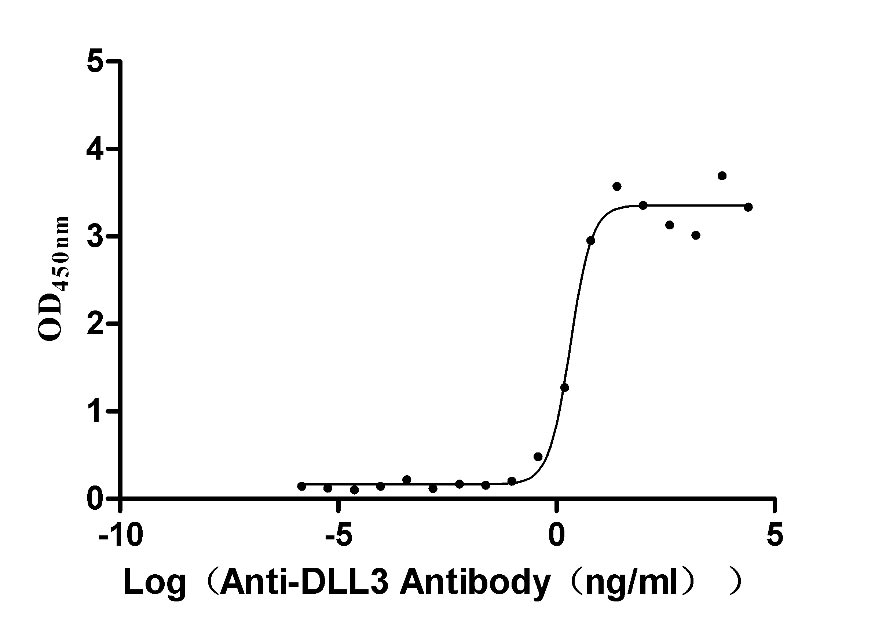
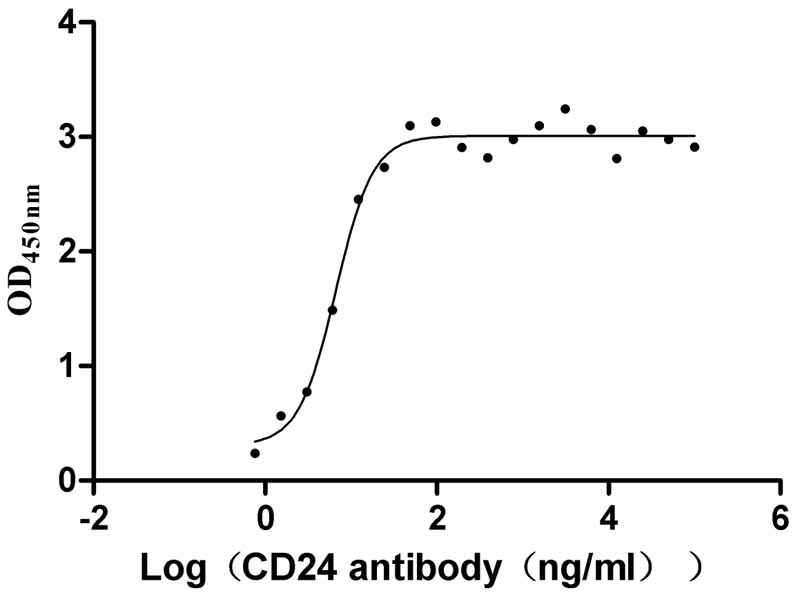
-AC1.jpg)
f4-AC1.jpg)
